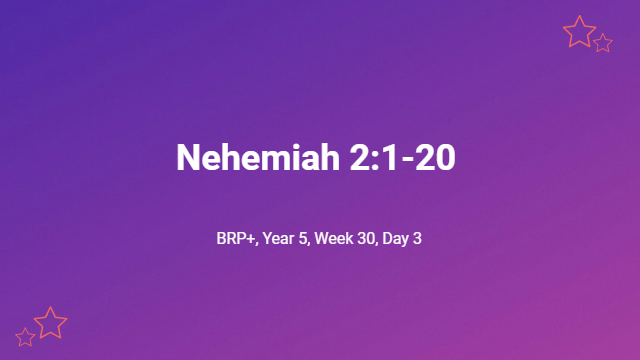Nehemiah 2:1-20
Q.1. How quickly was Nehemiah’s prayer answered? Why was the king’s response scary? How did God overrule in the king’s response to Nehemiah? What was his request? – (Neh.2:1-8)
Nehemiah received the report from his brothers and began praying four months earlier. He wept and mourned about the news of the plight of the returnees to Jerusalem … and it showed. When King Artaxerxes asked why he was sad – I was very much afraid (Neh.2:2). Moodiness in the king’s presence wasn’t usually tolerated. However, Nehemiah responded – … Let the king live forever. Why should my face not be sad when the city, the place of my fathers’ tombs, lies desolate and its gates have been consumed by fire? (Neh.2:3). Nehemiah’s prayers were answered. When the king asked what he wanted him to do, Nehemiah sent an immediate prayer to God (Neh.2:4). Artaxerxes revealed himself to be a very direct and matter of fact person, with his short questions – (i) What is the matter with you? (ii) What do you want? (iii) How long will it take? (Neh.2:2-6). The king’s response was an answer to prayer. Nehemiah confidently gave the king a time, a request for safe passage, and for sufficient building materials. Nehemiah’s bold requests were granted by the king – … because the good hand of my God was on me (Neh.2:8). Nehemiah gave all the glory to God.
Q.2. Did everything go smoothly? What was the strategy of the enemy? How did Nehemiah respond to these opponents? Why? – (Neh.2:9-10, 19-20)
Predictably, Nehemiah’s mission was greeted with immediate opposition from the enemy – When Sanballat the Horonite and Tobiah the Ammonite official heard about it, it was very displeasing to them that someone had come to seek the welfare of the sons of Israel … But when Sanballat the Horonite and Tobiah the Ammonite official, and Geshem the Arab heard it, they mocked us and despised us and said, “What is this thing you are doing? Are you rebelling against the king? (Neh.2:10 & 19) The enemy’s strategy was to mock and malign the people of God. However, Nehemiah trusted in One much greater than the enemy. He replied – … The God of heaven will give us success; therefore we His servants will arise and build, but you have no portion, right or memorial in Jerusalem (Neh.2:20). They refused to let their opponents influence them in any way.
Q.3. What was Nehemiah’s initial approach to the wall-rebuilding project? When did he call the people to rebuild the wall? For what reason? – (Neh.2:11-18)
Shortly after arriving at Jerusalem, Nehemiah worked privately on a plan of attack – I arose in the night, I and a few men with me. I did not tell anyone what my God was putting into my mind to do for Jerusalem and there was no animal with me except the animal on which I was riding (Neh.2:12). He inspected all the broken-down walls of the city (Neh.2:13-16). He was then able to galvanize the people together – … You see the bad situation we are in, that Jerusalem is desolate and its gates burned by fire. Come, let us rebuild the wall of Jerusalem so that we will no longer be a reproach (Neh.2:17). Nehemiah identified with the people – You see the bad situation we are in (Neh.2:17). Furthermore, he gave as his appeal – so that we will no longer be a reproach (Neh.2:17). He encouraged them with his own personal journey and testimony – I told them how the hand of my God had been favourable to me and also about the king’s words which he had spoken to me. Then they said, “Let us arise and build.” So they put their hands to the good work (Neh.2:18). These are insightful strategies for any leader who is aiming to inspire his people to serve the Lord.

